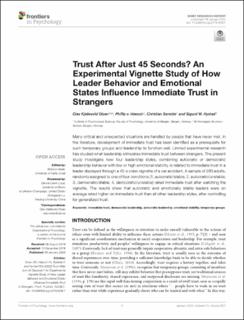Trust After Just 45 Seconds? An Experimental Vignette Study of How Leader Behavior and Emotional States Influence Immediate Trust in Strangers
| dc.contributor.author | Olsen, Olav Kjellevold | |
| dc.contributor.author | van Heesch, Philip | |
| dc.contributor.author | Søreide, Christian | |
| dc.contributor.author | Hystad, Sigurd William | |
| dc.date.accessioned | 2022-03-17T10:11:38Z | |
| dc.date.available | 2022-03-17T10:11:38Z | |
| dc.date.created | 2020-01-15T15:10:01Z | |
| dc.date.issued | 2020 | |
| dc.identifier.issn | 1664-1078 | |
| dc.identifier.uri | https://hdl.handle.net/11250/2985770 | |
| dc.description.abstract | Many critical and unexpected situations are handled by people that have never met. In the literature, development of immediate trust has been identified as a prerequisite for such temporary groups and leadership to function well. Limited experimental research has studied what leadership stimulates immediate trust between strangers. The present study investigate how four leadership styles, combining autocratic or democratic leadership behavior with low or high emotional stability, is related to immediate trust in a leader displayed through a 45-s video vignette of a car accident. A sample of 280 adults, randomly assigned to one of four conditions (1, autocratic/stable; 2, autocratic/unstable; 3, democratic/stable; 4, democratic/unstable) rated immediate trust after watching the vignette. The results show that autocratic and emotionally stable leaders were on average rated higher on immediate trust than all other leadership styles, after controlling for generalized trust. | |
| dc.language.iso | eng | |
| dc.title | Trust After Just 45 Seconds? An Experimental Vignette Study of How Leader Behavior and Emotional States Influence Immediate Trust in Strangers | |
| dc.type | Peer reviewed | |
| dc.type | Journal article | |
| dc.description.version | publishedVersion | |
| dc.description.version | publishedVersion | |
| dc.source.volume | 10 | |
| dc.source.journal | Frontiers in Psychology | |
| dc.identifier.doi | 10.3389/fpsyg.2019.02921 | |
| dc.identifier.cristin | 1774078 | |
| cristin.ispublished | true | |
| cristin.fulltext | original | |
| cristin.fulltext | original | |
| cristin.qualitycode | 2 |
Tilhørende fil(er)
Denne innførselen finnes i følgende samling(er)
-
Scientific articles [2181]

